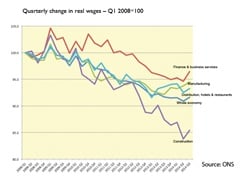Although real wages (that is, after inflation has been taken into account) across all sectors of the economy started to rise towards the end of last year, for the year as a whole they fell again, according to the government's latest figures produced by the Office for National Statistics (ONS).
The ONS says "… this recent rise in wages owes as much to lower rates of inflation as it does to stronger nominal wage growth… These data suggest that median real earnings fell between 2010 and 2013 [by 8%], and fell by 1.6% in 2014 compared with a year earlier".
Taking 2008 as the base line, real wages in construction fell 15.3% between 2010 and 2015, compared with a fall of 7.9% across the economy as a whole.
Construction output in 2014 rose 7.4%, according to government figures in February.
Note: It has been pointed out to us that these figures seem to contradict what Chancellor George Osbourne said in the Budget on 18 March. He said real incomes show people are, on average, £900 a year better off now than in 2010. The reason the figures seem to conflict is because the Chancellor was using figures for all income (including shares and investment) and not just wages. Wages have fallen across all sectors. Although top salaries have increased well ahead of inflation, the earned incomes of the majority have fallen, leading to the overall drop in wages.

